What is a virtual exchange? Maybe not what you think. We’ll be digging deeper into that in this special edition of Absolutely Intercultural coming to you from Denmark. My name’s Anne Fox and this is show 232. Today’s show is mainly about promoting dialogue between different groups of people. So what is dialogue? And can you tell the difference between dialogue and, for example, debate?
Tag: FH Koblenz
absolutely intercultural 175 +++ Australia Day +++ can-do attitude +++ the lucky country +++
Please put your headphones on and listen to Show 175 from Australia! If you like the podcast then please also LIKE US ON FACEBOOK!
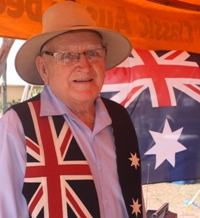 Today our show will take you to the “Lucky Country“, where the inhabitants with distinctive multicultural backgrounds have developed a positive “can-do”- attitude and try to give everybody a “fair go”.
Today our show will take you to the “Lucky Country“, where the inhabitants with distinctive multicultural backgrounds have developed a positive “can-do”- attitude and try to give everybody a “fair go”.
Listen to my interviewees in Australia. On the last weekend in January we celebrated Australia Day, and I took along the microphone to share my impressions with you.
absolutely immigrated
Let us listen to two typical Australians whose ancestors came over from Europe. I met Vivian and Wayne in Sydney Harbour over coffee and with the beautiful view on the Opera House and the Harbour Bridge and when I was conducting the interview I wished we had a video podcast so I could have shared with you a perfect hot summer morning in late December.
absolutely Aussi
Three weeks later I had left New South Wales and was back on the Sunshine Coast. Let us see whether in Queensland being Australian is also about football, meat pies, and BBQs. I asked some colleagues from the University of the Sunshine Coast how they were planning to celebrate Australia Day. Bishnu told us that when he first moved to Australia he did not really like eating lamb but now it has turned into his favourite dish. Talk about successful integration!
absolutely aboriginal
I am following up this topic of the first owners of the land and asked how the attitudes of ordinary Australians towards Aborigines and Torres Strait Islanders have changed over the years in society and in education.
absolutely multicultural
Every year the Australian of the Year is elected and this person will give important public speeches during that year. This year I was fortunate enough to be able to listen to the speech of the outgoing Australian of the Year talking about attitudes to indiginous people and to multiculturalism in general. You could really see on Ita Buttrose’s face how happy she is that her ancestors came over to Australia in the 1850ies.
absolutely original
On 26 January I visited Australia Day in Noosa, Queensland, in search of examples and explanations of the”can-do” attitude, the “fair go” and the “Lucky Country”. I did not have to search long because the first person I met, John Major, “Bush Poet” and former farmer, explained to me in his own words what these Australian concepts are all about for him.
And do not miss the brass band at the beginning and the end of that interview!
Would you like to share with us your own intercultural experience in foreign countries? If so, we would be delighted to hear both positive and negative experiences, so don´t hesitate and share your intercultural experiences with it with us on our Facebook Page.
Our next show will be coming to you on 7 March from Anne Fox in Denmark.
Until then –
Bleiben Sie absolut interkulturell!
And please visit our Facebook page.
The host of this show is: Dr. Laurent Borgmann
absolutely intercultural 171 +++ semester abroad +++ intercultural experiences +++ Germany +++ exchange student support +++
If you like the podcast then please also LIKE US ON FACEBOOK!
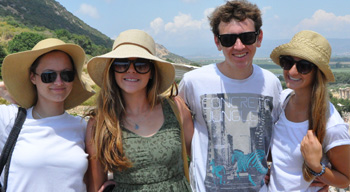 Our exchange students from Australia and Hungary have finished one year studying and doing their internships in Germany. Spending a long time far away from home – all on your own – will probably change your way of thinking and of doing things. Maybe – it will even make you cross that invisible line between being a teenager and an adult.
Our exchange students from Australia and Hungary have finished one year studying and doing their internships in Germany. Spending a long time far away from home – all on your own – will probably change your way of thinking and of doing things. Maybe – it will even make you cross that invisible line between being a teenager and an adult.
Have you ever thought about spending some time abroad in order to acquire intercultural experiences? Or are you still undecided, because you have too many worries about leaving your comfort zone and getting along in a foreign country?
You are in good company, our international exchange students, too, had many worries before they arrived at our university but they did survive their year abroad with a smile in their faces.
absolutely open-minded
During the last year our Australian exchange students collected a number of intercultural experiences in Germany and Turkey. They met many new people and made many new friends.
But before they came to Germany, they also had many worries in their heads.
I interviewed Tehlia, Matthew and Lucy – all Australian students in order to hear more about their main worries and getting some suggestions for future exchange students.
absolutely helpful
We asked ourselves what kind of help future exchange students need during the planning of their semester abroad. I interviewed Adelheid Korpp. She told us more about typical questions and worries of exchange students before they arrive in Germany.
It seems to be mostly about accommodation…
absolutely life-changing
Barbara Neukirchen, our colleague who looks after the “outgoing students” will share her impressions of how students have changed after their stay in a foreign country. I asked her how the students find out about their options for spending a year abroad.
absolutely inspired
Andreas Faulstich, lecturer at RheinAhrCampus, is going to explain in how much his year in Scotland influenced his style of teaching.
Would you like to share with us your own intercultural experiences in foreign countries? If so, we would be delighted to hear both positive and negative experiences, so don´t hesitate and share your intercultural experiences with it with us on our Facebook Page.
Our next show will be coming to you on 1st of November from Anne Fox in Denmark.
Until then –
Bleiben Sie absolut interkulturell!
And please visit our Facebook page.
The host of this show is: Dr. Laurent Borgmann
Editor: Younes Jaber
absolutely intercultural 151 +++ Australia Day 2012 +++ multilingualism +++ patriotic celebrations +++ BBQs and Barbies +++
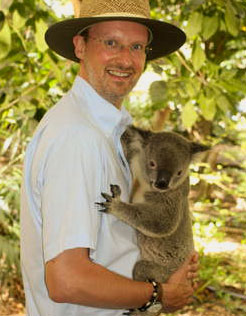
absolutely down-under
Like my last show, episode 151 also comes to you from Australia. You can listen to how I get woken up by exotic birds outside my bedroom window every morning because I thought I should record my introduction at this time of the day to share this experience with you because this has become my regular Australian alarm clock. As I live just metres from the national park I assumed they must have some kind of noisy monkeys in that park but then I discovered, it was birds, such as cockatoos, kookaburras, and some very colourful small parrots that I cannot identify. After a month in the country I finally manage to sleep through this incredible noise, and if I didn’t, I would have to get up at 4:30 every morning when this dubious concert starts. This week my class and tutorial at the University of the Sunshine Coast will not take place because of Australia Day 2012, a national public holiday. So I started asking people what this national day is all about and I received many, but sometimes contradictory answers because while this day is meant to promote and celebrate national unity it seems that every year it is accompanied by the criticism that instead of promoting multiculturalism this day commemorates the 26 January 1788 the arrival of the First Fleet at Sydney Cove where English settlers put up their flag. So opponents tend to call it “Invasion Day” and propose to change the national public holiday to another date. Let me share with you what some Australians told me about Australia Day. (If you want to find out more about Australian Identity you may want to revisit Anne’s show 76 on “mateship” and if you want to check out what my own life in Australia sounds like, check out my own last show 149.
absolutely diverse
I would like to introduce you to my neighbours here in Australia. Simone and Leonardo from Switzerland. Their background is so multicultural that it would perhaps be difficult for them to be nationalistic. I got interested when I noticed that mother and son were using several different languages even between them during an ordinary day.
Believe me I was very confused I when I saw Simone and Leonardo for the first time. From where I was sitting I thought I could distinctly hear about five or six people talking in three different languages but when I looked up I could see only two and had to realize that these two were actually using all three languages between them.
absolutely nationalistic
Australia Day is an opportunity to celebrate what is best about Australia including vegimite, BBQs, and cricket but some people are also critical of the fact that the image which is projected on this day is a very “white perspective” where the indigenous people do not really play an important role. I took my microphone into the classrooms to find out what it means to be Australian and what the day actually celebrates. Let us first listen to Mark from England and Meredith and Josh who are Australians. I also asked three international students what they knew about Australia Day and whether they could draw parallels to national or patriotic celebrations and movements in their own countries. I talked to Daniel from Sweden, Martin from the Netherlands and Clement from France.
absolutely barbie
My mate Len shares with me the secrets of the most Australian of all institutions which no Australia Day can do without. The BBQ or the “Barbie”. I had never thought about the unifying factors of this very male-dominated cooking experience. It is true that every house I have seen so far had a fixed BBQ and there are even public BBQ places in every scenic spot on the coast so that families can have an outdoor experience and bring their own food and drink.
Our next show will be coming to you from Anne Fox in Denmark on 2 March
Until then –
Bleiben Sie absolut interkulturell!
The host of this show is: Dr. Laurent Borgmann
![]() Download
Download
absolutely intercultural 149 +++ Queen and Obama in Australia +++ Day in the life of Laurence +++ Master in International Marketing +++ EXlites solar lighting +++ stereotypes French-German +++
 Hello Mates and G’day, this is show 149 of our podcast absolutely intercultural. And it is coming to you all the way from down-under, Queensland, Australia where I am teaching and doing some research for one semester. Two months ago, in October 2011, the Queen of England visited Australia. Only a month later, in November by the President of the United States came to Australia, too. And now, in December I started my summer term as a visiting academic at the University of the Sunshine coast (LOL). So who am I? My name is Elmar-Laurent Borgmann and after all these important state visits which were widely reported about in the Australian media I would today prefer to concentrate on more mundane, everyday aspects of life in Australia as experienced by a European. And yet, I hope we will be able to surprise you with some stimulating intercultural findings. Our interviewees today are from France, from Germany, and of course from Australia.
Hello Mates and G’day, this is show 149 of our podcast absolutely intercultural. And it is coming to you all the way from down-under, Queensland, Australia where I am teaching and doing some research for one semester. Two months ago, in October 2011, the Queen of England visited Australia. Only a month later, in November by the President of the United States came to Australia, too. And now, in December I started my summer term as a visiting academic at the University of the Sunshine coast (LOL). So who am I? My name is Elmar-Laurent Borgmann and after all these important state visits which were widely reported about in the Australian media I would today prefer to concentrate on more mundane, everyday aspects of life in Australia as experienced by a European. And yet, I hope we will be able to surprise you with some stimulating intercultural findings. Our interviewees today are from France, from Germany, and of course from Australia.
absolutely down-under
Let us look at an ordinary day in Australia. Some people back in Europe listened to my absolutely down-under reports during my last stay in Australia. They had heard about a “Tropical Christmas by the Pool” or a “National Australia Day” which I described both in previous shows and learned a lot about intercultural differences. However, some of them asked me to concentrate more on a the normal, regular, everyday life in Queensland. And they are right – we do expect holidays and celebrations to be different in different countries – but how about a regular university day? Hmm, what a challenge. I had thought this was too boring to record but maybe not? So, I followed myself with the microphone and recorded my intercultural impressions one morning from getting up at 7 o’ clock until I arrived at the University of the Sunshine Coast at 9. You will notice from my comments how much I like this part of the world – except for the first minutes after waking up – I admit, I am not a morning person. In the podcast you catch me waking up with my windows wide open to the tropical forest. In a second part later in the show I continue my intercultural report about a regular Australian morning going to work on the Sunshine Coast in my car. I would like to share some thoughts about beautiful landscapes but also of rather masculine-looking cars and trucks in this country before I arrive at the University of the Sunshine Coast where finally I see some wild kangaroos, not on a road sign but in real life and much closer than I expected …
absolutely business-like
I will also take you into the university, where international students from Europe will describe how in their International Marketing Class they did some work for an Australian Business. The round-table discussion was recorde after an exam situation a couple of weeks ago right at the start of the summer semester 2011/2012. To me summer 2011/2012 still sounds rather weird as in Europe only winter semesters could span two calendar years. So this is just another reminder that we are in the southern hemisphere. But back to the classroom. I was invited to sit in on the exams of students on the Master of International Business program. Apart from myself as external examiner, there was of course Dr. Leone Cameron, the regular lecturer but also, Mike Arieni, Managing Director of EXlites, a regional business for whom the group of international students had done some research about solar Energy in Europe. I asked the group how this combination of international students, an interculturally trained lecturer and a local business person enhanced their academic progress. Leone’s Master course the students had the chance to get in touch with a real business man and help him prepare his business plan for entering the European Market. Just like Mike, I, too, was impressed by the depth of the students’ research and I had a feeling that Mike took very good notice of the opportunities and challenges that the students presented for the different European countries. In a second part we will also hear from Waldemar Schneider and Clément Slastan about some of the stereotypes the international students confirmed when they lived together in shared apartments. Clément seems to have noticed a certain “lack of flexibility” in the Germans.
Once you have heard the show, please go to our “write us an email“-button in the right margin and tell us whether you liked these slightly unusual intimate insights into my own life down-under and whether you would like to get more such personal reports.
Our next show will be coming to you from Anne Fox in Denmark on 6 January.
Until then –
Bleiben Sie absolut interkulturell!
The host of this show is: Dr. Laurent Borgmann
absolutely intercultural 138 +++ Saudi Arabia +++ Iraq +++ NYOI +++ Diversophy +++ Refugee Week +++
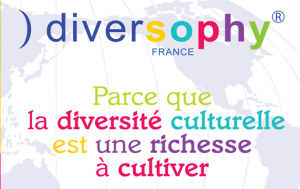 In this show we’ll be hearing about how games can help your intercultural awareness. We’ll also be following up on a couple of items from the last show by going to Iraq to hear more about the National Youth Orchestra of Iraq initiative which brought Arab and Kurdish Iraqis together to make music and we’ll be re-visiting the issue of the right of Saudi women to drive cars in cities.
In this show we’ll be hearing about how games can help your intercultural awareness. We’ll also be following up on a couple of items from the last show by going to Iraq to hear more about the National Youth Orchestra of Iraq initiative which brought Arab and Kurdish Iraqis together to make music and we’ll be re-visiting the issue of the right of Saudi women to drive cars in cities.
absolutely independent:
In the last show we went absolutely independent when we heard about the Saudi women who were going to drive their cars on June 17th in a bid to convince the authorities to accept this practice. Actually June 17th was not meant as a one-off but as a start date, but it seems that the day went well with quite a few women driving their cars with only minor brushes with the police as a result. This is in contrast to what happened with a similar action in 1990 when the women then were harassed by the authorities and other citizens and described as ‘The fallen: Advocates of vice and corruption on Earth’. ‘A source of depravity’ and when other citizens were advised to ‘Take whatever action you see fit’ to bring them under control. What’s the difference between then and now? Perhaps that, because of social media, the eyes of the world were on Saudi Arabia on this occasion.
absolutely social
So does social media such as Twitter and Facebook have an effect on culture? That is a question which I shall be exploring as part of a webinar organised by Christine Develotte and Fred Dervin on June 29th. More specifically we will be looking at whether social media can actually contribute to developing intercultural competences. You will find the link to the free webinar here.
absolutely playful
We’ve covered games before and today we’re going to hear from George Simons working with Kati Volt about his Diversophy game, how it works and a bit of background about how the game is made. So how can you gain some intercultural awareness through a game? George Simons of Diversophy.com explains the game which started out as a face to face card game but now also comes in online and Android smart phone format. We also hear about sample cards in the game and how people react to them. In fact George and I had a great deal more to talk about; too much for one show, so you’ll be hearing more from George and his gaming approach in future shows. In the meantime you might like to try one of the Diversophy Android apps on your Smart phone.
absolutely musical
Now let’s be absolutely musical and hear a little more about that incredible orchestra put together by audition on YouTube which puts together traditional enemies, Arabs and Kurds, to play together in an Orchestra which is due to perform at the Beethoven Festival in Bonn this coming October. In previous shows we have heard from Paul MacAlindin, the conductor and Karin Wolf, the viola teacher, as well as the RheinAhr Campus students whose task it was to find a way of raising awareness of the event. In this show I will play you an extract from one of the videos put together to explain the background to this very special orchestra. You can see and hear the whole video here.
absolutely desperate
Did you know that this week is international refugee week? In Australia it was marked by an amazing reality show, Asylum Exit Australia: Go back to where you came from , in which over three consecutive nights you followed the journey of six ordinary Australians who made the refugee journey to Australia backwards; in the words of the programme makers :
Deprived of their wallets, phones and passports, they board a leaky refugee boat, are rescued mid-ocean, experience immigration raids in Malaysia, live in a Kenyan refugee camp and visit slums in Jordan before ultimately making it to the Democratic Republic of Congo and Iraq, protected by UN Peacekeepers and the US military. For some of them it’s their first time abroad. For all of them, it’s an epic journey and the most challenging experience of their lives.
This is all about trying to walk in the shoes of others or leaving your comfort zone and is meant to confront viewers with their stereotypes of refugees as spongers and taking the easy option and so on. For the moment this has only been broadcast on Australian TV. But the TV company have added another way in which you can get a taste of what it might be like to have all your normal certainties suddenly taken away from you, in the form of a simulation. The game starts in Australia where, through some unamed political developments, you are suddenly in extreme danger of your life and need to escape. How does it feel to have to leave the place you consider home, to suddenly not know who you can trust? These are the sorts of issues which the game explores. You can try it out for free. I’d be interested to hear your reactions so do add a comment here after playing it. .
Ways to support “The National Youth Orchestra of Iraq”:
The National Youth Orchestra of Iraq would especially welcome your support on the various social media sites if you have a moment or two to spare.
YOUTUBE: 1. NYOI plays for kids, 2. General Information, 3. KICKSTARTER
FACEBOOK: 1. German, 2. International
Our next show will be coming to you from Dr. Laurent Borgmann in Germany on 8th July 2011
The host of this show is: Anne Fox
Editor: Markus Scherer
absolutely intercultural 131 +++ changing perspectives +++ annoying behaviour in class +++ hospitality club +++ freezing in Australia +++
 Why do different people have different perspectives? How can the same person have different perspectives on traffic only because one time the person experiences it in the car and the next day on a bicycle? How do our perspectives on events change over time. How big is the cultural influence on our perspective? And how does our perspecive change when we move to another culture?
Why do different people have different perspectives? How can the same person have different perspectives on traffic only because one time the person experiences it in the car and the next day on a bicycle? How do our perspectives on events change over time. How big is the cultural influence on our perspective? And how does our perspecive change when we move to another culture?
absolutely changed
All of us have different perspectives on the everyday things that surround us, we watch news on television, hear stories and we think we are perfectly informed about everything. But are we really? Sometimes a trip to another country or a new episode in our lives can change our perspective on the World dramatically.
Take Paul MacAlindin for example. He moved from small-town Scotland to big-town Germany and this move changed his geographical perspective to one which for Continental Europeans seems very normal.
absolutely irritating
Emese Bognar an exchange student from Hungary, vividly illustrates different perspectives and changing perspectives when she told me what irritated her when she attended a lecture and how her perspective on traffic changed, when she did her driving license.
absolutely hospitable
Agnes Dus from Hungary interviewed Adelheid Korpp, who had tried the “hospitality club”, which is a clever system for travelers to get cheap accommodation. The traveler applies for accommodation to a host, contacts the host and asks if they can stay for 1 or 2 nights. This seems to be a pleasant way for travelers to get around and have a cheap bed for the night. However, more importantly, this could be a good way to change your perspective from that of a regular tourist to that of a dear friend invited to the country. But let us listen to Adelheid how this works in detail, because first of all you need to get approved.
absolutely freezing
In our fourth and last category Roman told me about his time in Australia; he spent a semester at the University of the Sunshine Coast in Queensland and we now really have to change our perspectives here, because he is telling us that in the middle of the Australian summer you can still feel pretty cold, but listen to him yourself.
Our next show will be coming to you from Anne Fox in Denmark on 01 April
Until then –
Bleiben Sie absolut interkulturell!
The host of this show is: Dr. Laurent Borgmann
Editor: Dino Nogarole
absolutely intercultural 129 +++ comfort zones +++ dangerous situations +++ scary moments +++ classical artist +++
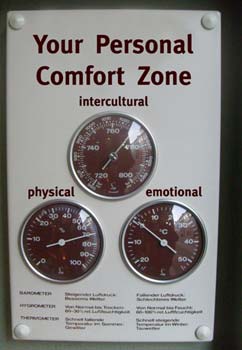 Welcome to show 129 of our Podcast “absolutely-intercultural”. Thanks you again to all of you who have helped us win in the non-profit category of the European Podcast Awards (fourth place in Germany and even number 1 in Denmark!). We really appreciate all your input and the attention our podcast has received as a result. We feel absolutely comfortable seeing that what we produce seems to have a wide audience of listeners.
Welcome to show 129 of our Podcast “absolutely-intercultural”. Thanks you again to all of you who have helped us win in the non-profit category of the European Podcast Awards (fourth place in Germany and even number 1 in Denmark!). We really appreciate all your input and the attention our podcast has received as a result. We feel absolutely comfortable seeing that what we produce seems to have a wide audience of listeners.
absolutely scared
Today we are going to talk about comfort zones and especially leaving our comfort zones. A comfort zone is the place where you feel comfortable, where everything seems to be easy and under your control. But what happens if you have to leave this comfort zone because of a change in your life or if you decide out of your own free will to leave your comfort zone? In our first category I had a meeting with people who have chosen to spend some time outside their comfort zones – by going to a foreign country: Lucy from Australia, Gintare and Vaida from Lithuania and Yasha from Turkmenistan decided to leave their comfort behind and experience something new. They left their home countries and entered a new world. I asked them which situations in their new lives were the scariest.
absolutely dangerous
If the feeling is strong, you may even feel out of place or unsafe in your new environments. This happened to Beatrice, when she went to Egypt on a holiday for the first time and all the new impressions, smells, the loudness of the street and the different behaviors of people she met, made her feel like a fish out of the water and she was even a little scared. In our second category I asked whether she could still remember leaving her comfort zone for the first time.
absolutely prepared
In our next category I will return to our round table, where the foreign students tell me how they try to introduce familiar objects from their home countries into their unfamiliar surroundings in order to be a little more comfortable even outside their comfort zones. But first I asked the participants to tell me what situations in their host country made them most uncomfortable.
absolutely comfortable
When I was putting together this podcast it seemed that nowadays it is a universal truth that we need to leave our comfort zones all the time? But can that really be right? I went out of my way to find someone who says that there are professions where everybody would want you to stay within the comfort zone. How ironic, I actually had to find an artist who would speak in favor of comfort zones so in our fourth and last category I finally spoke to Paul MacAlindin, a classical musician who is active in organizing international orchestra performances, e.g. for the National Youth Orchestra of Iraq, of which he is the Musical Director. I asked him where he leaves his comfort zones during his artistic work and also in his private life. To my surprise he explained that in classical music most stakeholders prefer not to leave their comfort zones.
Our next show will be coming to you from Anne Fox in Denmark on 05 March
Until then –
Bleiben Sie absolut interkulturell!
The host of this show is: Dr. Laurent Borgmann
Editor: Dino Nogarole
absolutely intercultural 127 +++ e-mail addicted +++ communication guide +++ social media +++ digital media +++
Today we are going to talk about how important social media and email have become in our lives. Do they help us be more productive or do they dominate our daily lives? 2010 may have ended peacefully and the holiday season was pretty calm but what was your first look at the internet like when you came back to work? Hundreds of email messages that were waiting for an answer? Dozens of requests to join somebody’s Linked-In network or to accept or decline messages because you are the moderator of a list or a blog? To be honest, after 10 minutes at the computer where I felt like a fire-fighter trying to get the worst catastrophies under control I was tempted to shut down the computer and do some “real work”. But did I? No, somehow I felt I needed to write quick answers, press “Like” butt0ns on Facebook and accept digital invitations because it all looked so urgent and real even though I was alone in my office and all the urgency was “only digital”.
absolutely addicted
I met Elaine and Will and had a discussion about how to monitor your work-life balance and perhaps separate your business and your private lives. In this respect almost all my friends fall into one of two very separate cultures and will explain to you that their particular work situation (rather than their own choice) determines their behavior. Are you the kind of a person who will switch off totally after work and recharge your batteries so that you can perform well in the work place afterwards? Or are you always connected and keep checking your email account at home even when you should be preparing dinner? If you decide not to look at your work email at home, does that this really mean that you are less than fully committed to your job or does the constant digital connection to your work place show that you cannot let go and eventually lead to burn-out syndrome? However we deal with this, most of us somehow have a bad conscience about our work-life balance one way or another, so let us discuss this and see whether digital addiction is actually a bad thing? In our first category Elaine and Will describe how two partners deal with this daily challenge in very different ways.
absolutely professional
In our second category Andreas Faulstich tells our interviewer Maria that some badly written email messages can drive him crazy and cause him a lot of extra work. Fortunately, there are only few messages which steal his time. Listen to how he tries to deal with these messages and how he suggests writing email messages more professionally. First, Maria asked Andreas how many email messages he receives every day?
absolutely connected
In our last category we organized a round table where I am talking with Lucy, Emese and Markus about how students who leave their home universities and study abroad can stay connected with family, friends and their home university through the digital media. Do we perhaps need to choose different channels for different target groups?
Our next show will be coming to you from Anne Fox in Denmark on 04. February
Until then –
Bleiben Sie absolut interkulturell!
The host of this show is: Dr. Laurent Borgmann
Editor: Dino Nogarole
absolutely intercultural 125 +++ Christmas time +++ New Year’s resolutions +++ international Xmas +++
Today is the 24th of December – this means Christmas trees, mulled wine, lots of snow recently, and if you were lucky you may have spotted the odd reindeer. In our show today I asked how my guests celebrate Christmas in Australia, Hungary and Germany but also how people formulate their New Year’s resolutions in different cultures.
absolutely santa
Our exchange student and podcast enthusiast Lucy Warren talks to Barbara Neukirchen, who is responsible for the outgoing students from RheinAhrCampus, Remagen. Lucy is interested in how Barbara celebrates Christmas time and whether this could be seen as typical for Germany. In our first category Barbara tells Lucy on which days Germans celebrate Christmas and how they celebrate the count-down to Christmas.
absolutely positive
Have you thought about your New Year’s resolutions? For example stop smoking or drinking less alcohol? Or losing a couple of pounds by going to the gym regularly? I asked Beatrice about her resolutions and she explained to me the difference between positive and negative ones. In our second category we listen to Beatrice’s view about New Year’s resolutions.
absolutely festive
I put together a round table with Lucy from Australia, Emese from Hungary and Andreas from Germany. All of them shared their typical customs and Christmas traditions from their families with me. Of course this does not mean that everybody in their culture celebrates in the same way – sometimes this may be just the culture of that particular family or region. Let us listen to very different experience which range from Christmas on the beach to Advent Calendars.
Our next show will be coming to you from Anne Fox in Denmark on 07. January 2011
The Team of “absolutely-intercultural” wishes you a Merry Christmas and a Happy New Year! Thank you for supporting us!
Until then –
Bleiben Sie absolut interkulturell!
The host of this show is: Dr. Laurent Borgmann
Editor: Dino Nogarole



